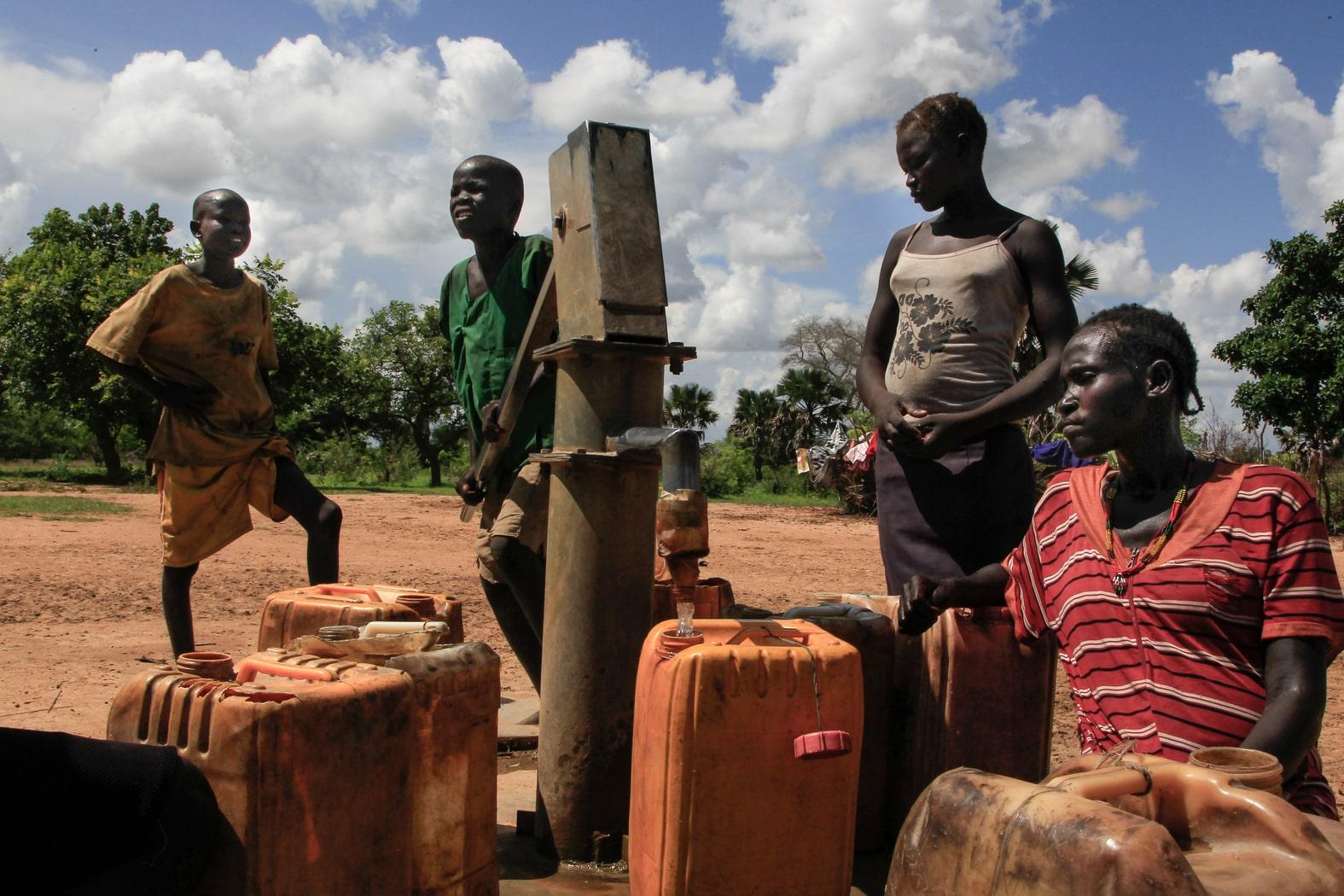
For decades, world hunger has been declining. But now, due to conflict, climate change, global inequality and other factors, famine threatens to return.
Definition of famine
A famine is defined as the most severe type of hunger crisis. It is very rare, but when it does occur, it means that there is an extreme shortage of food and that children and adults in a given area are starving to death on a daily basis.
Some deadly emergencies occur suddenly, such as earthquakes, floods and other natural disasters. This is not the case with famine. A famine occurs slowly, caused by long-term conflicts, climate crises, extreme poverty and other factors. Famines are never inevitable, they are always predictable, preventable and man-made.
WHEN A FAMINE IS DECLARED
Famine is a technical term: it is only officially declared when specific criteria of food insecurity, mortality and malnutrition are met.

20%
1 in 5 households
suffers from extreme
food shortages.

30%
More than 3 out of 10
people are
undernourished.

4
of every 10,000 children
under the age of five
die of hunger
every day.

2
of every 10,000 people
die of hunger
every day.
How famine is declared
To declare a famine, the world uses the Integrated Phase Classification (IPC) system, a framework involving governments, UN agencies, organisations such as Action Against Hunger, civil society and other relevant partners. Together, using the IPC's scientific standards and analytical approach, partners rank the severity and magnitude of food crises in a country.
The IPC establishes five phases for hunger crises, ranging from Phase 1 (Minimal/None) to Phase 5 (Catastrophic/Famine), each with its own set of technical criteria.

The key to understanding food emergencies is data, and lots of it. Action Against Hunger and its partners conduct food security and nutrition surveys to collect information on food availability, malnutrition levels and mortality rates.
All data are then compiled and analysed, and the IPC partners agree on the overall results and conclusions. If a country, or part of a country, meets the famine criteria (IPC Phase 5), all partners - including the country's government - must reach consensus on these outcomes before famine is declared. Famine declarations can sometimes become political rather than humanitarian decisions.
Before and after a famine is declared, the goal of the IPC system is to trigger action to prevent famine crises from deteriorating further and to save lives. But while it is a very useful tool, the system is far from perfect.
It is often the very conditions that cause hunger that make it incredibly difficult to collect the data needed to determine whether a famine is occurring.

CONFLICT CAUSES HUNGER
Conflict is the main cause of hunger. Violence and insecurity put civilians at risk, while making it difficult to assess the severity of a food crisis and to access those communities most in need of assistance. Unfortunately, this means that there are times when famine is suspected - even likely - but there is not enough information to confirm it.
When was the last famine?
There have only been two famines in the 21st century. In 2011, in the midst of severe drought and conflict, famine was declared in Somalia after some 250,000 people died. In 2017, after years of civil war, parts of South Sudan were found to be suffering from famine.
For months before both famines were declared, the UN and humanitarian organisations warned of deteriorating humanitarian crises. Aid eventually arrived, but for hundreds of thousands of malnourished children and families, it came too slowly.
Is hunger still a concern today?
After many years of progress in the global fight against hunger, a combination of factors - conflict, climate change and global inequality - has brought millions of people to the brink of starvation.
According to the UN, as many as 49 million people in 46 countries could now be at risk of famine if they do not receive urgent assistance. The countries most at risk of famine are in the Central American Dry Corridor and Haiti, through the Sahel, Central African Republic and South Sudan, to the Horn of Africa, Syria, Yemen, Afghanistan and the Occupied Palestinian Territory.
Although famine has not been declared - and may never be - alarm bells are ringing now, and the world must listen. We cannot wait until famine is officially declared to act and save lives.


HOW WE HELP COMMUNITIES FACING FAMINE
We provide life-saving treatment to severely malnourished children and deliver emergency cash, food and clean water. Our teams also help assess the severity of food crises by surveying communities and providing and analysing data.
Our teams also research better ways to understand, prevent and address hunger crises, advocate for greater humanitarian access to communities in need, and press world leaders to take action to create a world free from hunger.
HOW DO WE FIGHT AGAINST HUNGER?
WATER AND SANITATION
WATER AND SANITATION
We provide clean water and sanitation to communities in need.
FOOD SECURITY
FOOD SECURITY
We address the root causes of hunger, helping people to earn an income and improve their food security.
NUTRITION AND HEALTH
NUTRITION AND HEALTH
We treat and prevent malnutrition and associated diseases.
RESEARCH AND INNOVATION
RESEARCH AND INNOVATION
Our research helps reach more children and stop hunger.
EMERGENCY RESPONSE
EMERGENCY RESPONSE
We help communities devastated by natural disasters and conflict.
SOCIAL ACTION IN SPAIN
SOCIAL ACTION IN SPAIN
We work to improve the employability and health of people at risk of exclusion.
JOIN THE FIGHT AGAINST HUNGER
DID YOU KNOW?
YOU GET UP TO
80% OF YOUR DONATIONS BACK
INSTITUTIONS
THAT SUPPORT US















